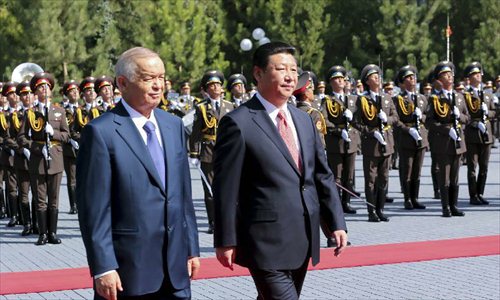HOME >> OP-ED
Xi visit shows new diplomatic thinking
Source:Global Times Published: 2013-9-10 0:33:01

Chinese President Xi Jinping (R front) attends a welcome ceremony held by Uzbekistan's President Islam Karimov before their talks in Tashkent, Uzbekistan, Sept. 9, 2013. Xi arrived here on Sept. 8, 2013 for a state visit to Uzbekistan. Photo: Xinhua
Chinese President Xi Jinping is still on his state visit in Central Asia. This visit to four countries in Central Asia shows that Beijing is paying special attention to this region.
This region, in the traditional mindset of international politics, has inevitably drawn major powers to rival for larger spheres of influence. China has been included in this by some analysts.
In Kazakhstan, President Xi reiterated China's three standpoints in dealing with foreign affairs with Central Asian countries: China will never interfere in the domestic affairs of Central Asian nations; China will never seek a dominant role in regional affairs; China will never try to nurture a sphere of influence. These remarks are not diplomatic cliché, but honest claims to build a new type of relations with foreign countries.
China is not an empire, and it rejects the deep-rooted imperial thinking in forging diplomatic relations. China was humiliated and bullied for a century, which made the country much more eager for equality than its Western counterparts.
China expands its diplomacy to Central Asia and the rest of the world not by guns and warships, but economic cooperation. In the meantime, such economic cooperation is also based on mutual benefits. When doing business in Central Asia, China does not claim itself as a "boss," but a partner.
In those coordinating projects with Central Asian countries, China does not have a bigger say, but insists on a bilateral decision-making mechanism. Mutual benefit is always the strongest energy that can make cooperation progress. Even though it is said that China is competing with other major powers in Central Asia, such competition is transparent and positive, because the one who can benefit first is Central Asia.
China's rise is inclusive and not exclusive. China stresses the values of co-existence and mutual benefits. China has realized that the framework of its national interests should be open-minded, which has to be built on reciprocal relations with other countries.
Western public opinion is constantly talking about how intense the competition between China and Western powers will be. However, China never has the intention to engage in an intense competition with any other country. China's economic takeoff has made its economic influence spill over but China has always been played a cooperative and reciprocal role in world business.
It is understandable that other countries have misread China because the world has been deeply influenced by the traditional zero-sum game. China is dedicated to developing new relations with the rest of world, simply because a peaceful and reciprocal development mode meets China's best interests.
The China-Russian relationship has already established a model for the rest of the world, and China and the US are trying to develop a new type of relations. It is believed that China will set up a new model with Central Asian countries so that countries with different power can build up a strategic cooperative pattern with mutual trust.
Posted in: Editorial